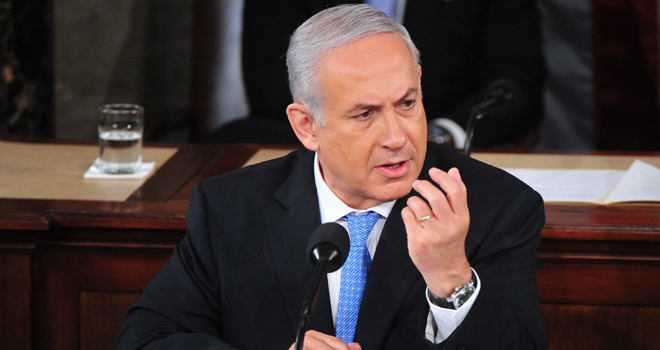Mitt Romney touted Israel’s higher GDP as compared to the Palestinian territories’ as evidence of the US ally’s cultural superiority (and perhaps a little divine providence), but Israeli Prime Minister Benjamin Netanyahu has been pretty explicit about linking Palestinian economic woes to the occupation.
In a speech to the United States Congress in May 2011, Netanyahu devoted a significant passage towards what he called the “booming” Palestinian economy, a development he attributed specifically to an easing of Israeli restrictions on movement and business. He suggested that peace would bring even stronger growth.
Here’s a portion of Netanyahu’s speech, via the Council on Foreign Relations:
We seek a peace in which they’ll be neither Israel’s subjects nor its citizens. They should enjoy a national life of dignity as a free, viable and independent people living in their own state. They should enjoy a prosperous economy, where their creativity and initiative can flourish.
Now, we’ve already seen the beginnings of what is possible. In the last two years, the Palestinians have begun to build a better life for themselves. By the way, Prime Minister Fayyad has led this effort on their part, and I — I wish him a speedy recovery from his recent operation.
We’ve helped — on our side, we’ve helped the Palestinian economic growth by removing hundreds of barriers and roadblocks to the free flow of goods and people, and the results have been nothing short of remarkable. The Palestinian economy is booming; it’s growing by more than 10 percent a year. And Palestinian cities — they look very different today than what they looked just a few years — a few years ago. They have shopping malls, movie theaters, restaurants, banks. They even have e-businesses, but you can’t see that when you visit them.
That’s what they have. It’s a great change. And all of this is happening without peace. So imagine what could happen with peace.
While Romney’s speech boasted of Israel’s economic strength, it made no mention to the Palestinians’ lack of a sovereign state or, as Netanyahu acknowledged, the economic impact of having to navigate a maze of checkpoints and other barriers in addition to the basic disruption of longstanding internal and external conflicts.
Far from a cause for celebration of Israel’s cultural superiority, Netanyahu has repeatedly identified a weak Palestinian economy as a critical barrier to peace in the past. He has said that negotiations should be preceded by an “economic peace,” which he believes is central to an eventual creation of a Palestinian state.
In a 2008 speech as opposition leader, he told Israeli lawmakers that “rapid development is key, and not only for the sake of negotiations with the Palestinians, but also so that Israel will be able to get out of the economic crisis.”
“The economic peace is not an alternative for peace talks but will help guide a winning process,” he said at the time. “We have seen this in the world, quickened economic development has helped form the conditions for peace and the resolution of conflict.”






